September 12, 2022 - Trans Canada Trail, steward of the longest recreational trail network in the world and largest investor in trail infrastructure projects in Canada, the Waterfront Regeneration Trust (WRT) in Ontario, the Community Foundation for Southeast Michigan and the Michigan Department of Natural Resources are pleased to announce the signing of a Memorandum of Understanding (MOU) to develop a binational Great Lakes tourism destination opportunity by 2024.
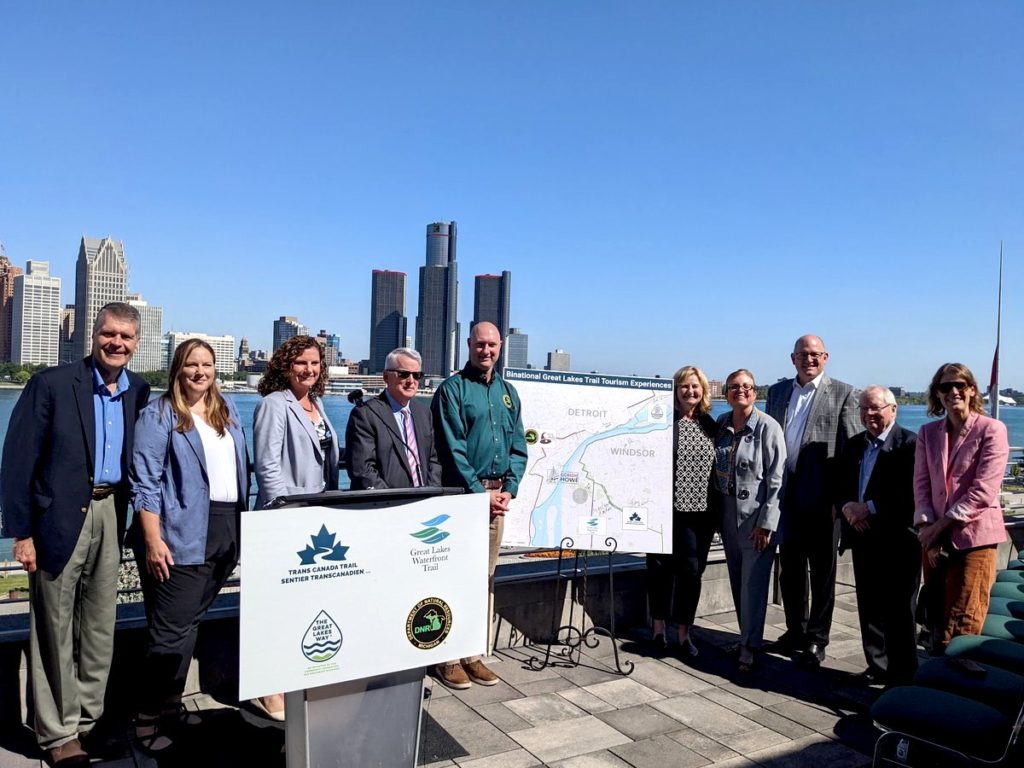
Coinciding with the opening of the Gordie Howe International Bridge, this destination opportunity will pave the way for cross-border trail tourism experiences promoting the use and enjoyment of the greenways, waterways and communities of Windsor, Ontario, and Detroit, Michigan, the border cities on the Detroit River considered the heart of the Great Lakes, and a gateway to each country.
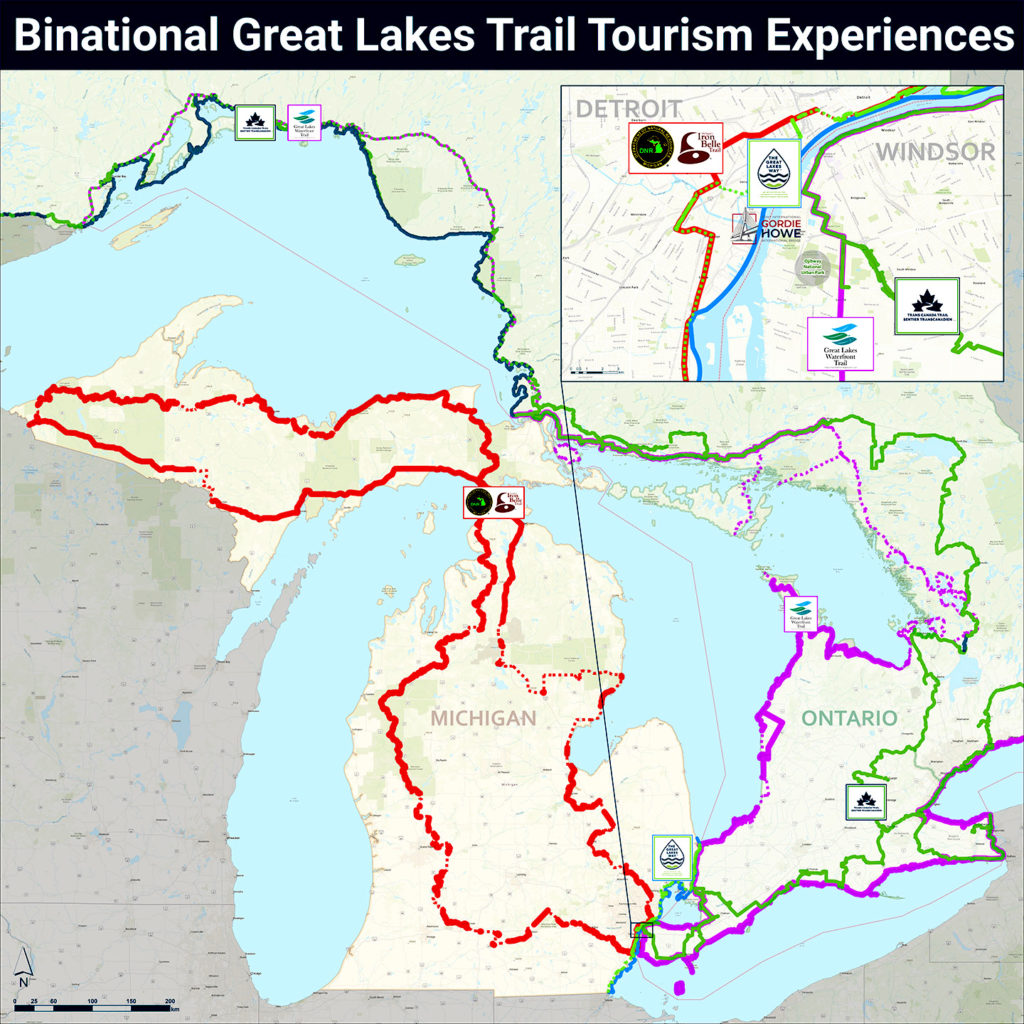
Eleanor McMahon, President & CEO, Trans Canada Trail signed the MOU at the St. Clair College Centre for the Arts in Windsor on Sept. 9 along with the Honourable David Crombie, Founder and Board Member of the Waterfront Regeneration Trust (WRT), Richard DeVore, President of the Community Foundation for Southeast Michigan and Dan Eichinger, Director of the Michigan Department of Natural Resources.
The binational partnership builds on greenway systems started first in Windsor in the 1960s and ‘70s, and in southeast Michigan in the ‘90s, in response to increasing public demand for access to the waterfront and active modes of transportation.
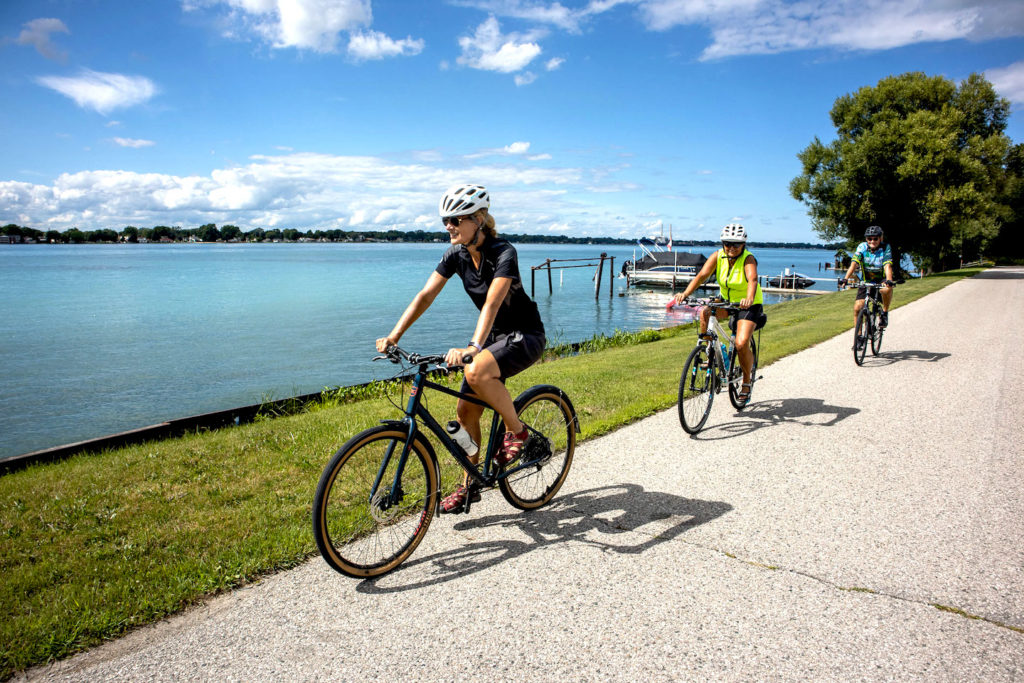
From the Great Lakes Waterfront Trail (3,600 km/2,200+miles), a part of the Trans Canada Trail (+5,200 km/3,200+ miles in Ontario) to the Iron Belle Trail in Michigan (+3,200 km/2,000+ miles) and The Great Lakes Way (+500 km/300+ miles), the MOU partners will amplify these existing trail networks and assets and leverage the non-motorized transportation (cycling and walking) infrastructure features of the new Gordie Howe International Bridge, for the enjoyment of residents and visitors.
Together, the partner organizations will develop a trail destination experience, collaborate on marketing strategies, and explore opportunities for using technology to enhance the trail-user experience via a digital trail mirroring the physical trail. In turn, the partnership will support economic development through exceptional eco-tourism, promote conservation, encourage healthy living and enhance quality of life.
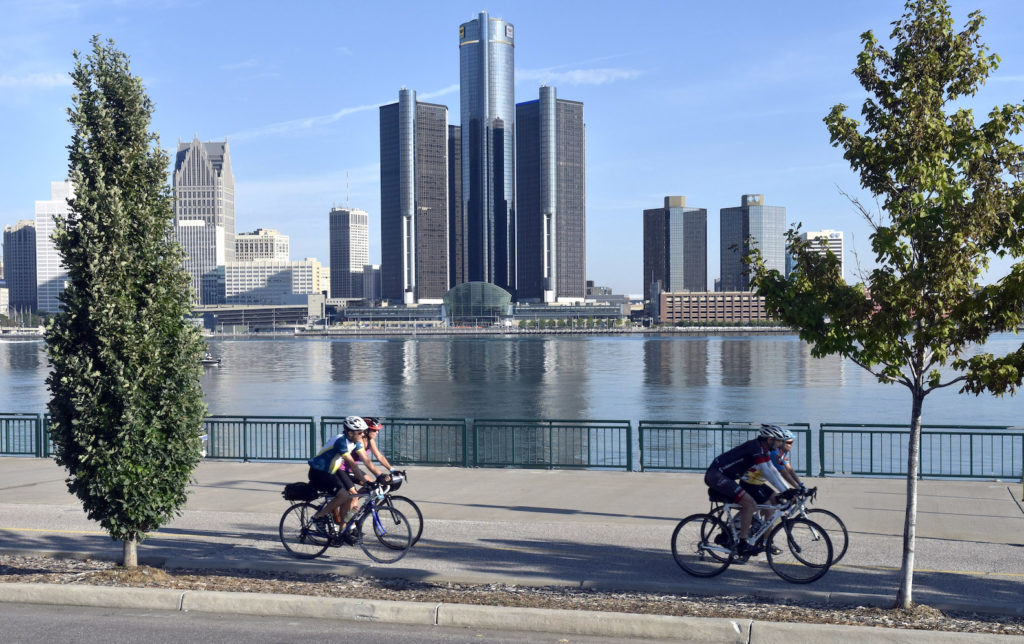
The vision behind the Great Lakes destination experience:
- Link the Great Lakes Waterfront Trail, part of the Trans Canada Trail network, to Michigan’s Iron Belle Trail and The Great Lakes Way via the new Gordie Howe International Bridge. An important tourism attraction, active transportation route and conservation opportunity, the bridge will convey residents and guests to the new Ojibway National Urban Park in Windsor and beyond.
- Connect visitors to the natural heritage assets on both sides of the border, such as the forthcoming Ojibway National Urban Park, which includes the Ojibway Shores and Nature Centre, encompassing land adjacent to the Detroit River shoreline.
- Connect cycling tourists from the United States to Ontario’s wine country in Essex County, Pelee Island, Lake Erie communities and the Niagara Region via the Waterfront Regeneration Trust’s Lake Erie cycling route, an easy day trip that would attract many.
Click here to explore an interactive map of the trails:
Recognizing the potential of trails as a significant tourism asset – particularly as visitors seek outdoor, recreation, staycations and cultural experiences – Trans Canada Trail initiated Canada’s first National Trail Tourism Strategy in 2020.
As part of this trail tourism strategy, Trans Canada Trail has developed the Exceptional Trail Experience program, to work with the travel and tourism sector and to support the capacity of the trail sector in Canada in developing export-ready, premier destination trails. The binational Great Lakes tourism experience will serve as a model for the Exceptional Trail Experience program, which Trans Canada Trail anticipates launching in 2023.
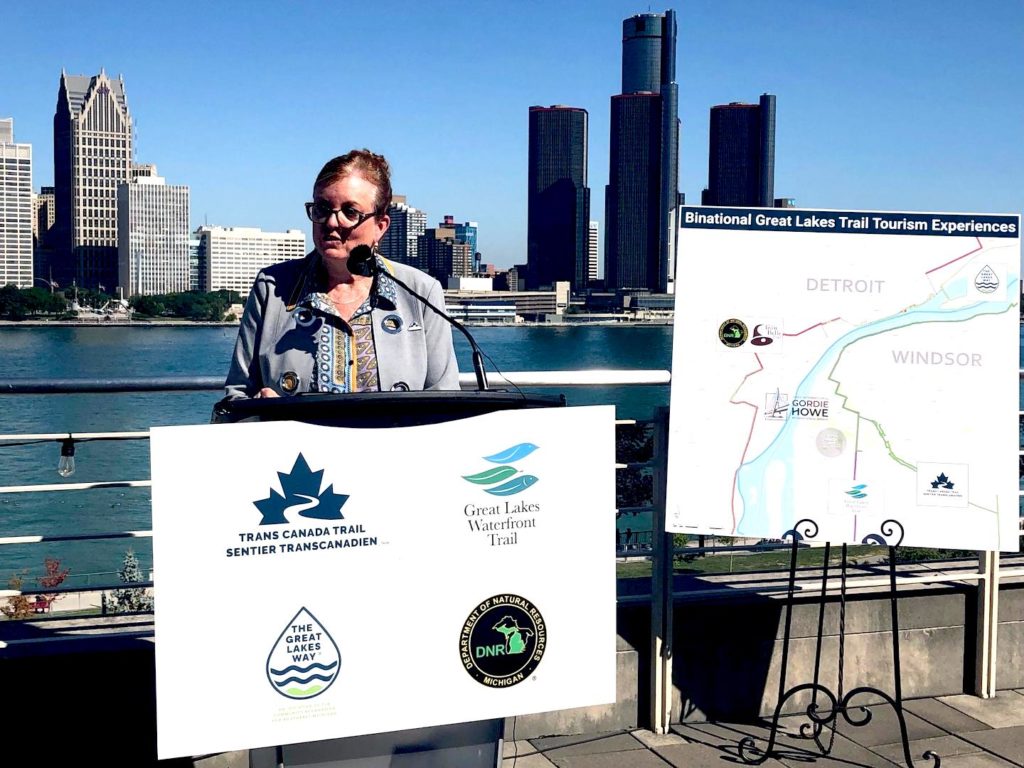
“We’re incredibly proud to join in this MOU with the Waterfront Regeneration Trust and our trail partners in the United States. Thirty years ago, the Trans Canada Trail began as a dream of a small group of Canadians who envisioned a national trail that would connect Canadians to nature and to one another. In this anniversary year, we are elated to expand on this foundational theme by taking it cross-border, opening doors to enhanced tourism and recreation opportunities, to active transportation corridors, and to activating Canada’s trail-based tourism economy. We know from our national polling research how vital trails have become for the health and well-being of Canadians. Not only is trail use growing in Canada, but we have seen the growing global demand for trail tourism. We are confident that this partnership will contribute to local economies on both sides of the border, and that this announcement will catalyze other opportunities for cross-border collaborations and further destination development initiatives, between Canada and the U.S.” – Eleanor McMahon, President & CEO, Trans Canada Trail
“The Waterfront Regeneration Trust is thrilled to join Trans Canada Trail, the Michigan Department of Natural Resources and the Community Foundation for Southeast Michigan to launch this exciting new collaboration. The Great Lakes Waterfront Trail was inspired by thousands of people who demanded more for their Great Lakes and understood the Trail was the first step in creating a new relationship to it. Today it is an award-winning, beloved amenity and tourism attraction. With the completion of the Gordie Howe International Bridge, we have the tremendous opportunity to connect our legacy work to amazing initiatives underway in the US. This partnership will realize the vision for binational trail tourism experiences that protect, connect and celebrate the Great Lakes, the world’s largest source of fresh water and treasured resource shared by the citizens of our two countries.” – Hon. David Crombie, P.C. O.C. OOnt., Founder and Board Member, Waterfront Regeneration Trust
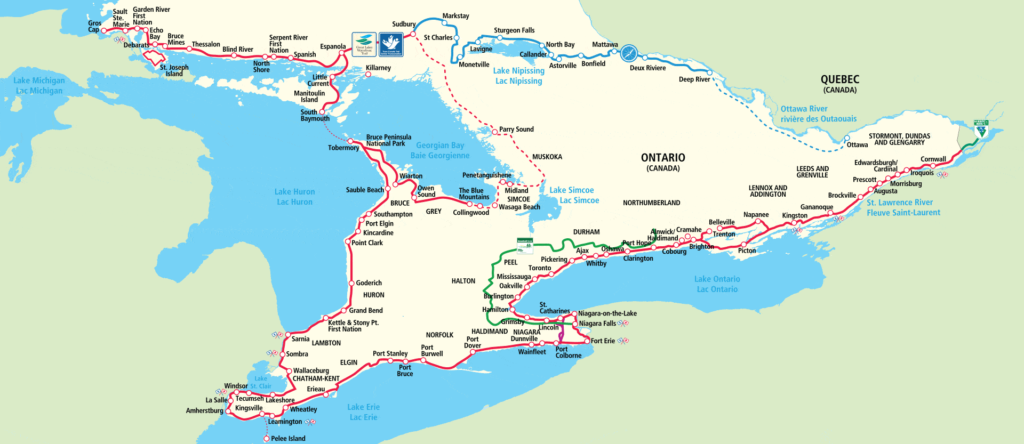
“We are so pleased that Trans Canada Trail and the Waterfront Regeneration Trust are joining forces with the Michigan Department of Natural Resource and the Community Foundation to collaborate on a binational trail experience,” says Richard DeVore, president of the Community Foundation for Southeast Michigan. “The Great Lakes Way initiative is about providing access to our amazing greenways and blueways and to connect communities. We are excited about the possibilities of this collaboration.”
“There are many ways Michigan continues to earn its reputation as our nation’s Trails State, and this partnership shines an international spotlight on enviable trail resources and outdoor adventure on both sides of the bridge. We’re excited about welcoming more people to Detroit, where much time, energy and investment have created an inviting bit of ‘up north’ downtown, and then encouraging them to take in the rest of our beautiful state. We’re especially proud of the Iron Belle Trail, stretching along two hiking and bicycling routes from Belle Isle Park in Detroit to Ironwood in the western Upper Peninsula. Recently, people have turned to state trails, parks and waterways like never before, seeking space, comfort and connection. The opportunities afforded by this partnership surely will provide even greater reward for getting outdoors.” – Dan Eichinger, Director of the Michigan Department of Natural Resources.

About the trails:
- Championed by the Community Foundation for Southeast Michigan, The Great Lakes Way is an interconnected set of 160 miles of greenways and 156 miles of water trails stretching from southern Lake Huron through western Lake Erie along southeast Michigan’s coastline. It connects people with outdoor recreational, historic and cultural activities. Watch a video about The Great Lakes Way.
- The Michigan Department of Natural Resources stewards the Iron Belle Trail that stretches more than 2,000 miles from Ironwood in the Upper Peninsula to Belle Isle State Park in Detroit.
- The Waterfront Regeneration Trust is the steward of the 3,600-km Great Lakes Waterfront Trail that hugs the shoreline of lakes Huron, Erie and Ontario, as well as Georgian Bay, and stretches from the St. Lawrence River in Quebec to Sault Ste. Marie, Ontario. Work is underway in partnership with the Trans Canada Trail to finalize a trail on the north shore of Lake Superior.
- At 28,000 km long on land and water, the iconic Trans Canada Trail is the world’s longest recreational network of multi-use trails and connects over 15,000 communities coast to coast to coast, from the Atlantic to the Pacific and the Arctic oceans.
About the Gordie Howe International Bridge:
- Providing connections to local road networks in both Canada and the US, the 2.5 km/1.5 mile-long, 3.6 m/11.8 feet-wide Gordie Howe International Bridge will include a toll-free multi-use, two-way path for pedestrians and cyclists to walk or bike across the Windsor-Detroit border and connect onto adjacent road and trail networks. Concrete barriers will separate vehicular traffic from pedestrians and cyclists to ensure the safety and security of the travelling public. (Info courtesy of the Windsor-Detroit Bridge Authority.)
About Trans Canada Trail
The Trans Canada Trail (the Trail) is the longest recreational trail in the world, spanning over 28,000 kilometres on land and water. Linking three oceans – the Atlantic, Pacific and Arctic – the Trail connects 15,000 rural, urban and Indigenous communities across every province and territory. It is a ribbon that connects Canada’s diverse landscapes, seasons, people and experiences, and fosters unity, collaboration and connectedness. Trans Canada Trail is a registered charity and stewards this national trail in collaboration with local Trail partners. With funding from the Government of Canada through Parks Canada, and investments from all levels of government and generous donors, Trans Canada Trail is the largest investor in trail infrastructure projects in Canada, supporting improvements, growth and enhancements for generations to come. tctrail.ca
About the Waterfront Regeneration Trust
Waterfront Regeneration Trust (WRT) is a registered charity leading a partnership of over 155 communities, First Nations, public and private organizations, and all orders of government to implement, expand, and promote the Great Lakes Waterfront Trail. Recognized as the first step of a broader strategy to regenerate the waterfront, the Trail’s 3600 kilometres serve both as a testament of a new commitment to our waterfront and waterways. Rooted in the principles that have guided the development of the Trail from its beginnings, we envision a Great Lakes Waterfront Trail that is complete and connected, an integral part of each ecosystem it passes through, enhancing the environment, economy, society and history of every community that participates in the development and use of the Trail. Most important, the Trail connects people to their Great Lakes waterfront and in doing so, engages them in the work of making our Great Lakes a healthy and vibrant place to live, work and visit. Waterfronttrail.org
About the Michigan Department of Natural Resources
The Michigan Department of Natural Resources is committed to the conservation, protection, management, use and enjoyment of the state’s natural and cultural resources for current and future generations. Learn more at Michigan.gov/DNR
About the The Community Foundation for Southeast Michigan
The Community Foundation for Southeast Michigan is a full-service philanthropic organization leading the way to positive change in our region. As a permanent community endowment built by gifts from thousands of individuals and organizations, the foundation supports a wide variety of activities benefiting education, arts and culture, health, human services, community development, and civic affairs. Since its inception, the foundation has distributed more than $1.4 billion through more than 85,000 grants to nonprofit organizations throughout Wayne, Oakland, Macomb, Monroe, Washtenaw, St. Clair, and Livingston counties. Visit www.cfsem.org to learn more.
















